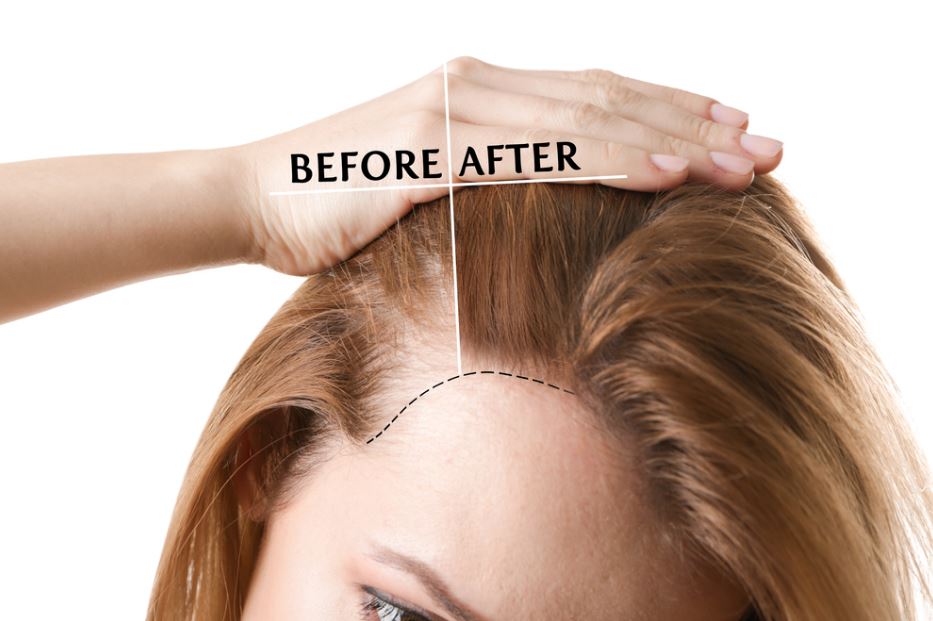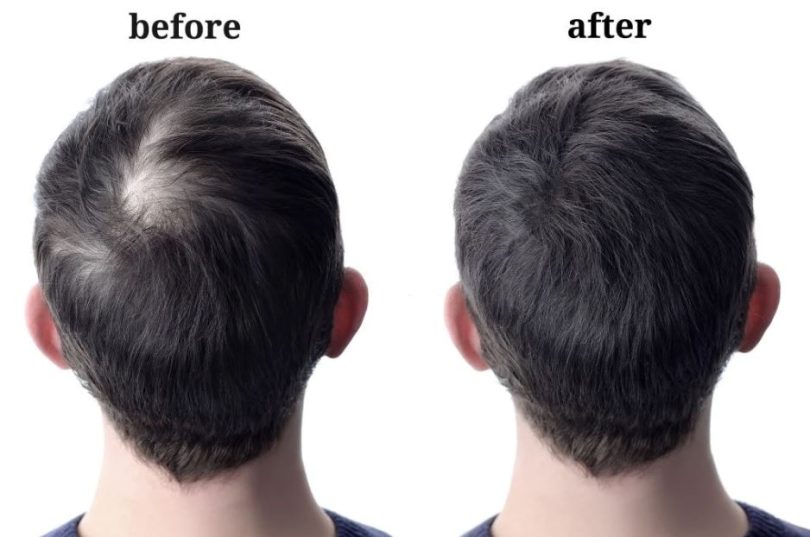How can I stop hair loss naturally?
How can I stop hair loss naturally? -Although there is no miracle treatment for hair loss, there are a number of natural methods that may help slow down or stop additional hair loss. It’s important to remember that individual outcomes may differ, and that the ideal way to apply these natural solutions for hair care and general health is as a component of a holistic strategy. The following are some natural remedies for hair loss:
- Balanced Diet: A balanced and nutritious diet is crucial for maintaining healthy hair. Include a variety of nutrient-rich foods, such as fruits, vegetables, whole grains, lean proteins, and healthy fats. Key nutrients for hair health include vitamins A, C, D, E, Biotin (B7), iron, zinc, and protein.
- Vitamin A: Found in carrots, sweet potatoes, spinach, and other colorful fruits and vegetables. It helps produce sebum, the natural oil that keeps hair follicles lubricated.
- Vitamin C: Found in citrus fruits, strawberries, and peppers. It aids in collagen production, which is essential for hair structure.
- Vitamin D: Exposure to sunlight helps the body produce vitamin D, which supports hair follicles.
- Vitamin E: Found in nuts, seeds, and leafy greens. It protects hair from oxidative stress and supports a healthy scalp.
- Biotin: Found in eggs, nuts, and seeds. Biotin is crucial for healthy hair growth.
- Iron: Found in lean meats, legumes, and spinach. Iron deficiency can lead to hair loss.
- Zinc: Found in nuts, seeds, and whole grains. It helps repair and grow hair tissue.
- Stay Hydrated: Drink an adequate amount of water daily to keep your body and hair hydrated. Dehydration can make hair dry and brittle.
- Avoid Harsh Hair Treatments: Minimize the use of chemical hair treatments, such as dyes, bleaches, and perms, as they can damage hair follicles and lead to hair loss.
- Reduce Heat Styling: Limit the use of heat styling tools like hairdryers, straighteners, and curling irons. Excessive heat can weaken hair and lead to breakage.
- Avoid Tight Hairstyles: Avoid hairstyles that pull on the hair, such as tight ponytails or braids. They can cause stress on the hair follicles and contribute to hair loss.
- Gentle Hair Care: Use a mild shampoo and conditioner suitable for your hair type. Avoid harsh hair products containing sulfates and parabens, as they can strip the hair of its natural oils.
- Scalp Massage: Regularly massage your scalp to stimulate blood flow and promote hair growth. Scalp massage can be done using your fingertips or with the help of essential oils.
- Rosemary Oil: Studies suggest that rosemary oil may promote hair growth by improving blood circulation to the scalp.
- Lavender Oil: Lavender oil is believed to have calming effects and may help reduce stress-related hair loss.
You can gently massage your scalp with a mixture of a few drops of essential oil and a carrier oil, like coconut or jojoba oil.
RELATED: What illnesses cause hair loss?

- Onion Juice: Onion juice has been studied for its potential to promote hair growth. It contains sulfur, which may improve blood circulation to the hair follicles and encourage hair growth.
- Extract fresh onion juice and apply it directly to your scalp. Leave it on for about 30 minutes before rinsing thoroughly with a mild shampoo.
- Aloe Vera: Aloe vera has soothing and conditioning properties that can benefit the scalp and hair.
- Apply fresh aloe vera gel directly to the scalp and hair. Leave it on for a few hours before rinsing with water.
- Green Tea: Green tea is rich in antioxidants, which may help stimulate hair growth and strengthen hair follicles.
- After shampooing, rinse your hair with freshly brewed and cooled green tea. Allow it to sit for a few minutes before rinsing with water.
- Coconut Milk: Coconut milk contains essential nutrients that can nourish hair follicles and promote hair growth.
- Apply coconut milk to your scalp and hair, leave it on for a few hours, and then rinse thoroughly with water.
- Balanced Hormones: Hormonal imbalances, such as those related to thyroid issues or polycystic ovary syndrome (PCOS), can contribute to hair loss. If you suspect hormonal imbalances, consider seeking medical advice to address the underlying issue.
- Manage Stress: Chronic stress can contribute to hair loss. Practice stress-reduction techniques, such as meditation, yoga, deep breathing, or engaging in hobbies that help you relax.
- Regular Exercise: Regular physical activity improves overall health and blood circulation, which can positively impact hair growth.
- Avoid Smoking and Excessive Alcohol: Smoking and excessive alcohol consumption can negatively affect hair health. Quitting smoking and moderating alcohol intake can benefit overall health, including hair.
- Limit Social Media and Beauty Standards Exposure: Social media and beauty standards can influence how we perceive ourselves and our hair. Focus on self-acceptance and avoid comparing yourself to unrealistic beauty ideals.
- Use Mild Hair Accessories: Avoid using hair accessories with sharp edges that can damage hair. Choose gentle accessories like fabric scrunchies or soft hair ties.
- Get Regular Haircuts: Trimming your hair regularly can prevent split ends and maintain healthier hair.
- Use Natural Hair Masks: Consider using natural hair masks made from ingredients like yogurt, honey, and egg whites. These can help nourish and condition your hair.
- Consider Herbal Supplements: Some herbal supplements, such as saw palmetto and ginseng, are believed to have beneficial effects on hair health. Consult with a healthcare professional before taking any supplements.
- Practice Patience and Consistency: Natural remedies may take time to show results, and consistency is essential. Stick to your hair care routine and give your hair time to respond to the changes.
- Consult a Healthcare Professional: If you experience severe or persistent hair loss, consult a healthcare professional or a dermatologist. They can help identify the underlying cause and explore appropriate treatment options.
Always keep in mind that hair loss is a complicated issue that is influenced by a variety of elements, including as heredity, medical issues, and lifestyle choices. A good hair care regimen can be supplemented with natural therapies, although each person may experience different outcomes. It’s critical to pay attention to your body, exercise patience, and make decisions that put your general wellbeing first.




